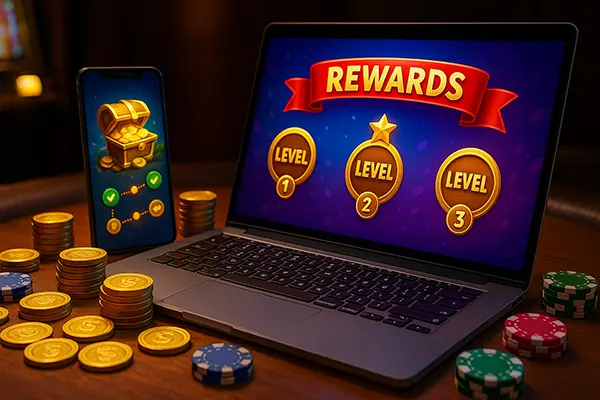
How Gamification Mechanics Keep Players Engaged in Online Casinos
Online casinos increasingly rely on gamification mechanics to sustain player engagement and build long-term loyalty. Instead of offering only games of chance, they add structured elements that create a sense of achievement, competition, and personal growth. This approach taps into psychological triggers that make players return, aiming to transform occasional visits into consistent activity.
Bonus Levels and Player Motivation
Bonus levels are a key mechanic that transforms regular gameplay into a progression system. Players move through multiple tiers, unlocking special rewards such as free spins, cashbacks, or exclusive features as they advance. The visible milestones encourage continued activity by giving players clear short-term goals to achieve.
Psychologically, bonus levels activate the human desire for completion and mastery. Each completed level releases dopamine, which reinforces the behaviour and motivates players to keep playing. This is similar to how progression works in video games, where each victory encourages the next attempt.
Casinos often personalise these levels using data-driven tools, adapting difficulty and rewards to individual habits. This approach reduces frustration and ensures the challenge remains stimulating but not overwhelming, which keeps players involved for longer sessions.
How Bonus Levels Shape Behaviour
UX psychologists note that bonus levels use operant conditioning — rewarding players frequently for small achievements. This type of reinforcement encourages consistent behaviour far more effectively than large but rare rewards. It makes players return daily to secure the next milestone.
The visual representation of progress, such as badges or achievement bars, also plays a crucial role. When players see their progress in real time, they feel ownership of their achievements, which strengthens emotional connection and commitment to the casino.
However, bonus levels can also encourage excessive play. Responsible gambling measures, such as time reminders, spending limits, and voluntary self-exclusion tools, should always accompany such features to protect players from harmful patterns.
Daily Quests and Routine Engagement
Daily quests are another common gamification element designed to keep players returning regularly. These are simple challenges that refresh every 24 hours, offering small rewards for completion. They create a habit loop where players log in daily to collect their prizes and maintain their streak.
Completing daily quests delivers instant gratification, which is a strong motivator. Players know that a short visit will bring a reward, reducing the mental barrier to engaging with the casino. Over time, this forms a routine that becomes part of their daily digital habits.
Daily quests also introduce a sense of urgency. Since they expire after a short time, players feel encouraged to act quickly. This urgency increases activity rates and keeps the audience more consistently active compared to less time-sensitive bonuses.
Psychological Effect of Daily Challenges
Experts in behavioural design explain that daily quests apply the principle of variable reinforcement. While rewards are predictable in timing, they often vary in size or type, which maintains curiosity and excitement. This unpredictability keeps motivation high.
Small challenges are also easier to integrate into daily routines, lowering the mental effort required to participate. When players feel that completing a task is quick and simple, they are more likely to do it consistently over time.
Still, daily quests can contribute to compulsive play if left unchecked. It is important that casinos provide tools like session timers and allow players to pause their quests without penalty, supporting healthier gaming behaviour.

Internal Currency and Long-Term Investment
Internal virtual currency acts as a bridge between effort and reward. Players earn tokens, coins, or points by playing games or completing tasks, which they can later exchange for bonuses, spins, or special items. This creates a feeling of ownership and investment that makes players value their progress more.
Unlike instant rewards, internal currency accumulates over time, encouraging players to return and grow their balance. This long-term accumulation deepens engagement because users perceive their progress as having tangible value within the casino environment.
Furthermore, casinos often use multiple currency tiers — for example, standard coins for regular play and premium tokens for exclusive achievements. This layered approach adds strategic depth and encourages players to plan their activity carefully to maximise their rewards.
Motivational Role of Virtual Currency
Psychologists note that internal currency uses the principle of delayed gratification. Players are willing to continue playing when they know that their efforts contribute towards a future reward, which keeps them engaged for longer periods.
The visibility of earned currency enhances this effect. Seeing balances grow provides a constant reminder of previous efforts, reinforcing the sense of progress and motivating further action.
To support healthy gaming, players should be encouraged to view internal currency as entertainment value rather than real money. Clear labelling, spending trackers, and reality checks help prevent confusion between virtual points and actual financial value.
